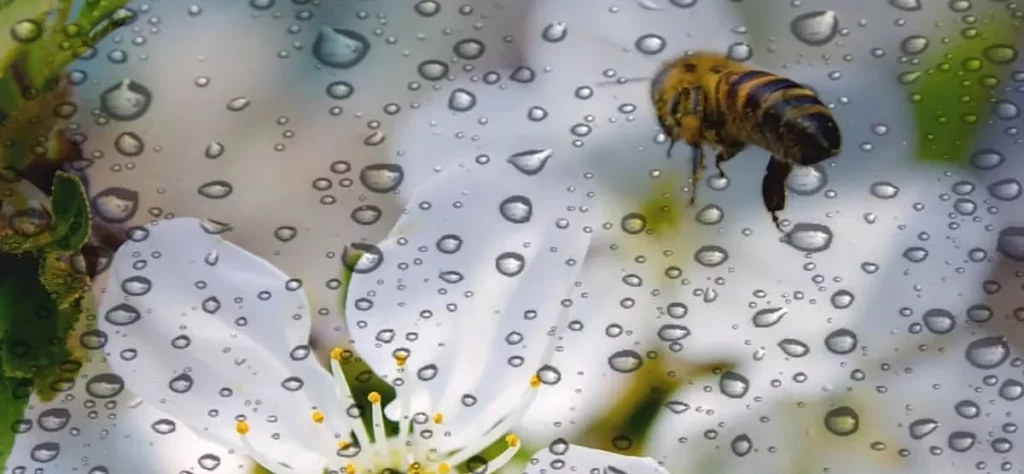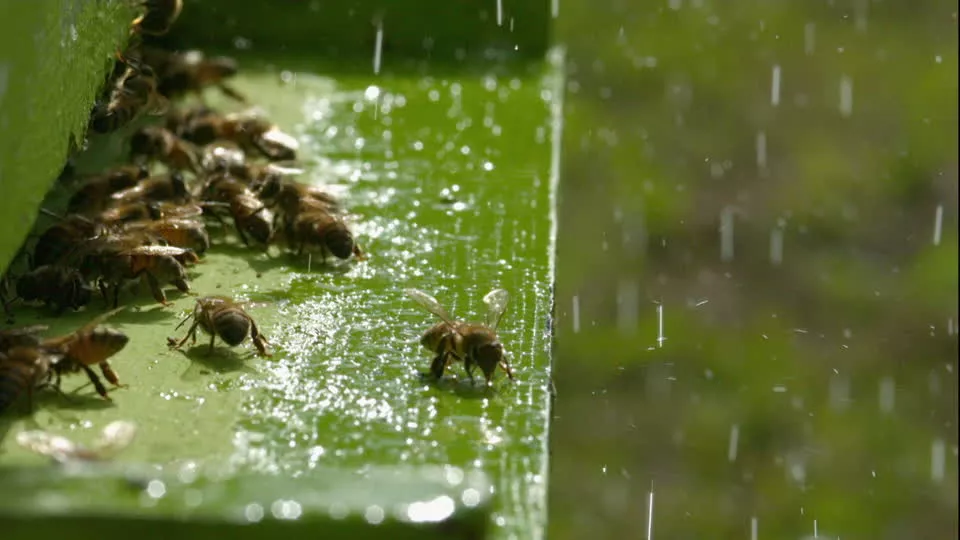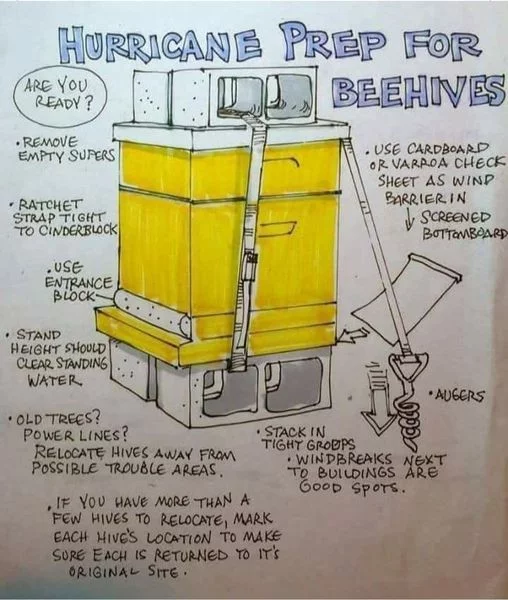When it rains, most animals spend that time in their habitats, which are protected from rain and storms. However, you must have seen bees in the rain sometimes and it made you wonder, can bees fly in the rain?
Can Bees Fly In The Rain?
Do bees fly in the rain? The short answer is YES, bees can fly in the rain, but it’s dangerous so they usually don’t fly. Light rain is generally not a problem, but it dangerous for the bee if it tries to fly in heavy rain. Sometimes, even fog can cause problems for bees, fog can build up on the bee’s body and interfere with its flight.

What Happens If A Bee Gets Wet?
During heavy rain, water accumulates on the bee’s wings and interferes with its flapping, which can cause the bee to fall to the ground and die. A bee is known to flap its wings 12,000 times per minute, so anything below that can pose a problem for its flight.
If the rain is heavy with large raindrops, the large drops can hit the bee and break its wing.
Although they would prefer to hide in their hives, we will still see some bees flying in the light rain in search of nectar and pollen.
Do Bees Come Out In The Rain?
So, light rain is generally not a problem for bees, but storms and heavy rains are very dangerous for bees.
But even if a bee comes out of the hive during a storm, it will seek shelter until the rain stops so that it can fly safely back to the hive. If a bee is already in the hive when a storm hits, it will usually stay until the rain clears.
Therefore, bees prefer to fly when the sun is out because it makes it easier for them to navigate and find food, as it is more difficult for them to navigate in cloudy and humid conditions.
Do Bees Know When Rain And Storm Are Coming?
Bees are more accurate in weather forecasting than state-of-the-art devices. They even know the intensity of rainfall.
Bees have a multitude of senses that help them detect even the smallest changes in the state of the atmosphere. Honey bees (Apis mellifera) stand out in particular. A completely accurate forecast, and especially an assessment of the intensity of precipitations, gives the answer as to whether a bee can fly in the rain.
Observe the behavior of the bees and find out what kind of weather awaits us.
If bees fly out early in the morning from the hives to graze in large numbers or fly unusually far in search of flower pollen and nectar, this is a reliable sign of good weather for the day in question. It is more puzzling when they do it in cloudy weather, and then soon the weather clears up.
If the bees in the hives do not rest during bad weather, but are constantly moving and buzzing, we should expect the weather to soon improve. It happens that in the morning, when the weather is nice, the bees do not go for the usual pollen collection, but rather stay in the hives and buzz loudly. In such circumstances, usually not even 6-8 hours pass until the first raindrops are notices. Sometimes the bees fly away from the hives, but they don’t usually go far. It warns of the possibility of worsening weather.
Likewise, when bees in large groups rush from the pasture to the apiary, it is necessary to prepare for the imminent onset of a storm-even if the sky at that moment looked harmless.
If the bees are irritable and pushy, this is often a sign of an imminent change in weather.
If bees fly out of the hive in the summer, but do not move away from it, but rather gather in large numbers on its walls, they warn of the onset of heat and extreme heat.
If the bees return from grazing later than they normally do, this could be a warning of the onset of a prolonged period of rainy weather.
Old beekeepers believe that bees do not leave the hives when the outside air temperature is lower than 50 °F.

Why Are Bees More Active Before The Rain?
A study published by Chinese researcher Xu-Jiang and his colleagues found that bees spend more time outside the hive when rain is near.
Honey bees are able to detect changes in carbon dioxide levels, temperature, pressure and humidity, which allows them to predict weather changes. One of the frequent weather changes is the rain, which is also the reason why the bees will try harder to do their work quickly.
Longer “Working Days“
Researchers at Jiangxi Agricultural University tagged 300 bees with tiny devices that allowed them to track the insects’ activity using a technique called radio frequency identification (RFID).
Marked worker bees were introduced to their colonies and monitored 24 hours a day for a period of 34 days using a special electronic reader.
When tagged bee workers entered or left the colony, the RFID system recorded their unique identification number, time stamp, and direction of flight.
The duration of each trip was calculated based on the exit and entry timestamps after sorting the data based on each RFID.
The researchers then divided the feeding data into two categories, days followed by a sunny day, and days followed by a rainy day.
Read the article: Do Bees Fly In The Dark? Can Bees See At Night Or At Dusk?
How Do Bees Prepare For Heavy Rains?
Just before a rainy day, it was found that the bees spent more time flying outside the hive, looking for nectar and honey plants, but in the days after the rain, when it was perfectly sunny outside, the bees were a bit lazy and stayed near the hives longer.
They also found that “leaving time“– the time of the day when the last bees returned to the hive – was later if the following day was expected to be rainy.
Communication Between Bees
This behavior suggests that the bees prepare and know when to use the flowers and gather food before the rain disrupts their plans.
By collecting food before rainy days, bees ensure their longer survival even when there is a long period of bad weather conditions.
Given that these changes are societal and not just individual, the question remains how worker bees convey the message to work harder after seeing or sensing indicators of impending weather changes such as rain.
Future studies will focus on which factors in the weather system are perceived and how bees convey the message for behavioral changes to the entire society.
How To Help A Bee That Got Wet From The Rain?
If you find a wet bee that looks like it has difficulty moving, the best thing you can do is gently move it to a sunny spot to dry and warm up. You can also offer some syrup, but it’s best to keep it near the bees rather than trying to force the insects to take the syrup. If the bee wants, let him eat.
How To Help Bees During A Storm?
The biggest danger to a hive during a storm is that it topples over or the cover flies off and then rain enters the hive. A full hive is very heavy and that’s good news for you because a heavy hive will be very hard to topple and move in a storm.
If you live in a hurricane or tornado prone area, you should have a plan to protect your hives so they don’t get knocked over during a storm.
Here are some suggestions to help your colony weather the storm:
- Move hives away from low-lying areas. Because the beehive can be flooded.When you move the hives, secure them and tie them to the base.
- Move the hive away from the tree. During a storm, fallen branches can damage your apiary.
- Secure the hives with ratchet straps. Placing the strap vertically around the entire hive allows the hive body and lid to be secured to the bottom panel. Attaching the lid to the box is also useful.
- Attach the beehives to the posts. A steel rod is hammered into the ground near the hive and the hive is secured to the pole with ratchet straps placed horizontally. This will help keep your hives from tipping over in the wind.
- Place a few bricks on the lids, and it’s best if you can tie them together with straps.

How you help bees during a storm depends on the intensity and duration of the storm. During most spring storms, bees are able to take care of themselves. However, when severe storms are expected, prudent beekeepers assist the bees by protecting the hive and providing additional forage if needed.

